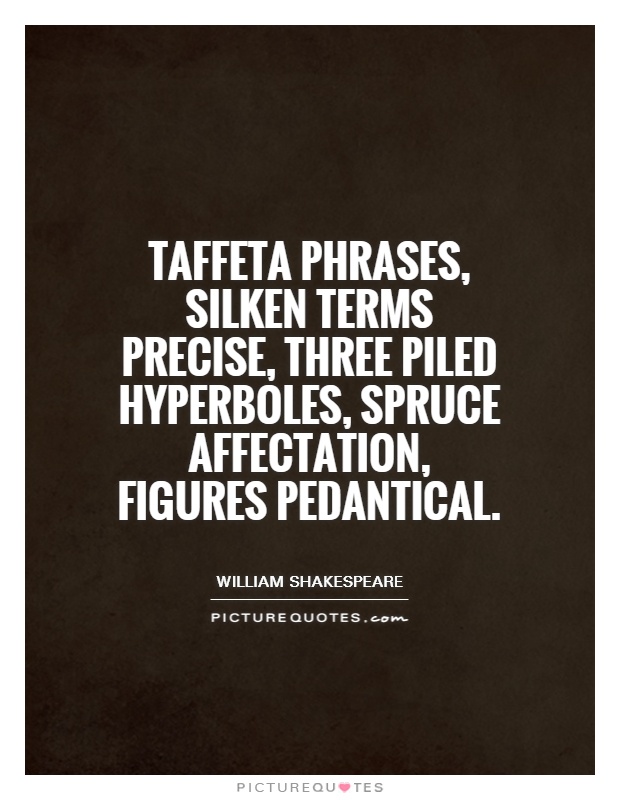Taffeta phrases, silken terms precise, three piled hyperboles, spruce affectation, figures pedantical

Taffeta phrases, silken terms precise, three piled hyperboles, spruce affectation, figures pedantical
In the world of William Shakespeare, language was a powerful tool used to convey emotions, thoughts, and ideas. The quote "Taffeta phrases, silken terms precise, three piled hyperboles, spruce affectation, figures pedantical" from Love's Labour's Lost perfectly encapsulates the elaborate and ornate language that Shakespeare often employed in his works."Taffeta phrases" refers to language that is smooth, elegant, and polished, much like the fabric taffeta itself. Shakespeare was a master of crafting phrases that were not only beautiful to hear but also rich in meaning. His use of metaphor, simile, and other literary devices created a tapestry of words that painted vivid pictures in the minds of his audience.
"Silken terms precise" suggests language that is refined and exact, like the delicate threads of silk. Shakespeare's precise choice of words and careful attention to detail allowed him to convey complex emotions and ideas with clarity and depth. His ability to capture the nuances of human experience in his writing is what has made his works timeless and enduring.
"Three piled hyperboles" refers to exaggerated or extravagant language, a hallmark of Shakespeare's dramatic style. He often used hyperbole to heighten the emotional impact of his characters' speeches and to create a sense of drama and intensity in his plays. By pushing language to its limits, Shakespeare was able to evoke powerful emotions and engage his audience on a visceral level.
"Spruce affectation" suggests a sense of artificiality or pretentiousness in language. Shakespeare was known for his wit and wordplay, and he often used clever puns, double entendres, and other linguistic tricks to entertain and engage his audience. His plays are filled with characters who use language as a weapon, manipulating words to achieve their own ends.
"Figures pedantical" refers to language that is overly formal or academic, perhaps even pedantic. Shakespeare was a master of language, but he was also a keen observer of human nature. He understood that language could be used to deceive, manipulate, or control others, and he often explored the power dynamics inherent in communication in his plays.
Overall, the quote "Taffeta phrases, silken terms precise, three piled hyperboles, spruce affectation, figures pedantical" captures the richness and complexity of Shakespeare's language. His words were not just a means of communication but a form of art, carefully crafted to evoke emotion, provoke thought, and illuminate the human experience. Shakespeare's mastery of language is what has made him one of the greatest playwrights in history, and his works continue to inspire and captivate audiences to this day.












 Friendship Quotes
Friendship Quotes Love Quotes
Love Quotes Life Quotes
Life Quotes Funny Quotes
Funny Quotes Motivational Quotes
Motivational Quotes Inspirational Quotes
Inspirational Quotes